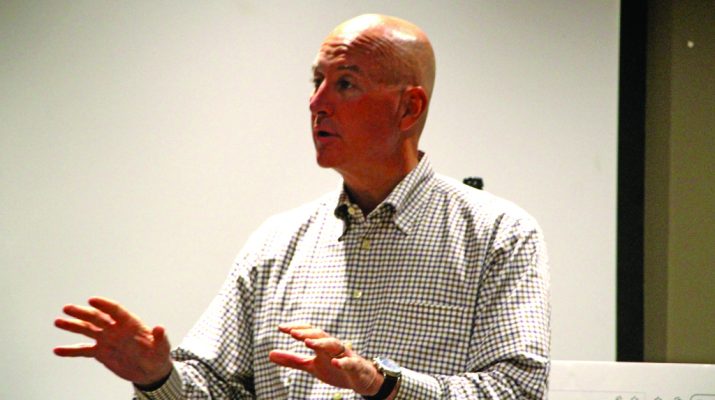During a recent visit to Alliance, Governor Pete Ricketts touted the importance of the Perkins County Canal Project in improving Nebraska’s water supply.
Ricketts emphasized that water is crucial to the state’s agricultural economy, noting that one out of four jobs is tied to agriculture throughout the state.
“We are also the largest irrigated state in the country,” said Ricketts. “Nine million acres. In fact three of every eight of our acres is irrigated. It is heavily dependent on making sure that we can use our water effectively here in the state. We have done a great job of it here in Nebraska.”
The creation of Natural Resource Districts has helped Nebraska to conserve its water resources, Ricketts explained. He noted that their creation has helped to maintain water in the Ogallala Aquifer.
“Because we have done a good job managing it, that aquifer is within one foot, on average, of where it was back in the 1950s,” Ricketts said. “I’ll contrast that to Colorado. Colorado has basically mined their aquifer. They are 15 feet down from where they were in the 1950s.”
Ricketts explained that he has been working with Attorney General Doug Peterson and state senators to develop the Perkins County Canal Project.
“This dates back to a canal that was begun over 100 years ago in Colorado to take water from the South Platte River in Colorado and connect it to a reservoir system in Nebraska,” said Ricketts. “One hundred years ago, there was a lot of fighting over that water in the South Platte. Nebraska and Colorado signed a compact in 1923 that was approved of by the Colorado legislature, our legislature and the U.S. Congress. This compact is the only legal document that we have between us and Colorado on the South Platte River.”
Ricketts said as part of the agreement, Colorado, from April 1 to Oct. 15, is required to deliver water to Nebraska via the South Platte River at 120 cubic feet per second. The amount, Ricketts explained, would increase to 500 cubic feet per second of water during non-irrigation season if Nebraska built a canal leading to a reservoir system in the state.
“That compact has been in existence for 100 years, and Nebraska has never taken the opportunity to build that canal,” Ricketts said. “We actually have eminent domain authority in Colorado to do it, but we’ve never done it, until now.”
Ricketts explained that the efforts surrounding the construction of the Perkins County Canal may seem sudden, but he noted they have been in the works for several years.
“The reasoning is because in 2016, Colorado passed a law, HB 16-1256, that was about studying their water needs and the South Platte River,” said Ricketts. “You all may know that Colorado’s front range is growing like gangbusters, Denver in particular, but all those municipalities, and they have an insatiable demand for water. So, they’ve been buying up water rights.”
If Colorado completes those projects, Ricketts noted, it is estimated that it will use up 90 percent of the water in the South Platte River.
“That’s Colorado’s intention,” Ricketts said. “In HB 16-1256, they clearly say that they are going to give us no more water than legally required. That’s in their state law now. What is legally required right now? Just the 120 cubic feet a second.”
Ricketts explained that he asked the Nebraska State Legislature for $500 million to build the Perkins County Canal. Legislature allocated $53.5 million to begin design work on the project and to get options on land in Colorado. Ricketts noted the project will take about 10 years to complete.
“It’s the only way that we can ensure that Colorado will actually give us the water we’re entitled to,” said Ricketts.
Ricketts said Colorado is already failing to meet the terms of the compact, showing a photo from the South Platte River near Roscoe without water flowing. Ricketts explained through the canal and reservoir system, they would be able to mitigate drought conditions by strategically releasing water to the Platte River.
Ricketts noted that seven percent of the City of Lincoln’s drinking water comes from the South Platte River, which has been affected by drought conditions that are seen throughout the state. He explained that if the project is not completed, and Colorado does not provide enough water through the South Platte River, then it will increase reliance upon the North Platte River, affecting water resources throughout the Panhandle.
“Which means that everybody in the Panhandle will have to cut back because we’re relying more on the North Platte River to meet all of our needs,” Ricketts said.

